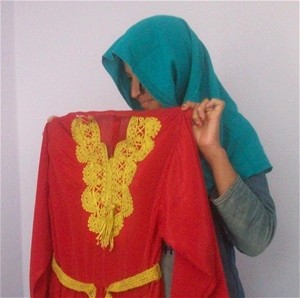
Halima displays a dress that she has embroidered in the cherma dozi style. Cherma dozi is a tradition in Afghan culture. Gold and silver threads follow a lace-like pattern around the neckline, sleeves, and borders of women’s dresses.
USAID/SPR-SEA/Gul Agha Baturi
Embroidery and literacy training provide women with job and life skills.
30 NOVEMBER 2009 | PAKTYA PROVINCE, AFGHANISTAN
Halima Khan, a 26 year old Afghan woman, has found hope and economic independence through instruction she is receiving in literacy, gender awareness, and the art of cherma dozi – a traditional form of Afghan embroidery. Halima is one of 120 vulnerable women in the Aryub Jaji District of Paktya participating in a USAID program to provide women with educational opportunities and job skills.
“I was married at the age of 14, and I became a widow at 18. My husband died nine years ago in a traffic accident. I have a daughter who is eleven years old,” Halima explained. “My daughter and I live and work in the home of my in-laws since the death of my husband. My father-in-law wants me to marry his younger son, who [already] has a wife and children. I do not want to marry his son. All I want is to care for my daughter and provide her with an education. My father-in-law keeps asking me who will provide food and security for me and my daughter, and until now, I did not have an answer. I now have hope for the future because of the skills I am learning in this training.”
USAID is working with an Afghan NGO, Mehr Educational and Human Rights Organization (MEHR), to provide Halima and others like her with a path to self-sufficiency. The program operates in an area where USAID is building a road, and the training complements construction by showing that roads bring development and new opportunities. There are six training centers established in villages along the new road, all serving local women.
The eight-month program empowers participants and provides them with the skills to improve their living conditions and earn a sustainable income. Each woman will receive a sewing machine at the end of the training and will be able to earn an estimated 100 to 150 afghanis (two to three dollars) per day.
“I am waiting for the time when I complete my training and I can tell my father-in-law that I can now earn money for myself and my daughter with my new skill of khayati (sewing chermas),” Halima declared. Thanks to the United States, Halima’s future is now bright, her daughter will be able to continue her education, and she will no longer be reliant on her father-in-law.







Comment
Make a general inquiry or suggest an improvement.